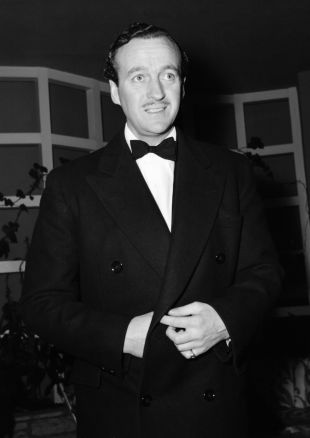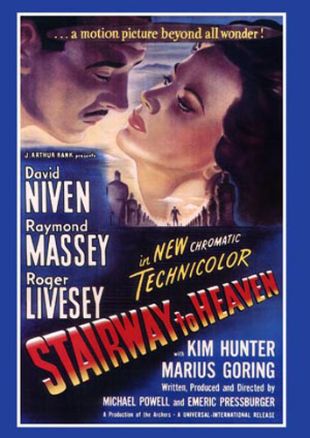The son a well-to-do British Army captain who died in the battle of Gallipoli in 1915, David Niven was shipped off to a succession of boarding schools by his stepfather, who didn't care much for the boy. Young Niven hated the experience and was a poor student, but his late father's reputation helped him get admitted to the Royal Military College at Sandhurst, and he was later commissioned as a second lieutenant in the Highland Light Infantry. Rakishly handsome and naturally charming, Lt. Niven met a number of high society members while stationed in Malta, and, through their auspices, made several important contacts while attending parties. Although he later claimed to have been nothing more than a wastrel-like "professional guest" at this stage of his life, Niven was actually excellent company, a superb raconteur, and a loyal friend, and he paid back his social obligations by giving lavish parties of his own once he become famous. Niven also insisted that he fell into acting without any prior interest, although he had done amateur theatricals in college.
Following his military discharge, Niven wandered the world working odd jobs ranging from a lumberjack to a gunnery instructor for Cuban revolutionaries to (by his own account) a petty thief. He became a Hollywood extra in 1935, and eventually came to the attention of producer Samuel Goldwyn, who had been building up a stable of attractive young contract players. Having made his speaking debut in Without Regret (1935), Niven quickly learned how to successfully get through a movie scene. After several secondary roles for Goldwyn, he was loaned out for a lead role in the 20th Century Fox feature Thank You, Jeeves (1936). The actor formed lasting friendships with several members of Hollywood's British community -- notably Errol Flynn, with whom he briefly lived -- and was quite popular with the American-born contingent as well, especially the ladies.
Although he worked steadily in the '30s, it was usually in support of bigger stars; he was seldom permitted to carry a film by himself, except for such modest productions as Dinner at the Ritz (1937) and Raffles (1939). Anxious to do something more substantial than act during World War II, Niven re-entered the British service as a Lieutenant Colonel, where he served nobly, if not spectacularly. (His batman, or valet, during the war was a Pvt. Peter Ustinov, himself an actor of no mean talent.) Married by the end of the war, Niven went back to films but found that he still wasn't getting any important roles; despite ten years experience, he was considered too "lightweight" to be a major name. His life momentarily shattered by the accidental death of his wife in 1946, Niven's spirit was restored by his second marriage to Swedish model Hjordis Tersmeden, his wife of 37 years until the actor's death. Once again, Niven took a self-deprecating attitude towards his domestic life, claiming to be a poor husband and worse father, but despite the time spent away from his family, they cherished his concern and affection for them.
After his Goldwyn contract ended in 1949, Niven marked time with inconsequential movies before joining Dick Powell, Charles Boyer, and Ida Lupino to form Four Star, a television production company. Niven was finally able to choose strong dramatic roles for himself, becoming one of TV's first and most prolific stars, although his public still preferred him as a light comedian. The actor's film career also took an upswing in the '50s with starring performances in the controversial The Moon Is Blue (1953) -- a harmless concoction which was denied a Production Code seal because the word "virgin" was bandied about -- and the mammoth Around the World in 80 Days (1956), in which Niven played his most famous role, erudite 19th century globetrotter Phileas Fogg. When Laurence Olivier dropped out of the 1958 film Separate Tables, Niven stepped in to play an elderly, disgraced British military man. Although he was as flippant about the part as usual -- telling an interviewer, "They gave me very good lines and then cut to Deborah Kerr while I was saying them" -- he won an Oscar for this performance.
Niven continued his career as a high-priced, A-list actor into the '60s, returning to television in the stylish "caper" series The Rogues in 1964. He revisited his hobby of writing in the early '70s; an earlier novel, Round the Ragged Rocks, didn't sell very well, but gave him pleasure while working on it. But two breezy autobiographies did better: The Moon's a Balloon (1972) and Bring on the Empty Horse (1975). Working alone, without help of a ghostwriter (as opposed to many celebrity authors), Niven was able to entertainingly transfer his charm and wit to the printed page (even if he seldom let the facts impede his storytelling).
In 1982, Niven discovered he was suffering from a neurological illness commonly known as Lou Gehrig's disease, which would prove fatal within a year. Courageously keeping up a front with his friends and the public, Niven continued making media appearances, although he was obviously deteriorating. While appearing in his last film, Curse of the Pink Panther (1983), the actor's speech became so slurred due to his illness that his lines were later dubbed by impressionist Rich Little. Refusing all artificial life-support systems, Niven died in his Switzerland home later that year. While his career produced a relatively small legacy of worthwhile films, and despite his own public attitude that his life had been something of an elaborate fraud, Niven left behind countless friends and family members who adored him. Indeed, journalists sent out to "dig up dirt" following the actor's death came back amazed (and perhaps secretly pleased) that not one person could find anything bad to say about David Niven.


/_derived_jpg_q90_310x470_m0/ThePinkPanther1964-PosterArt.jpg)
